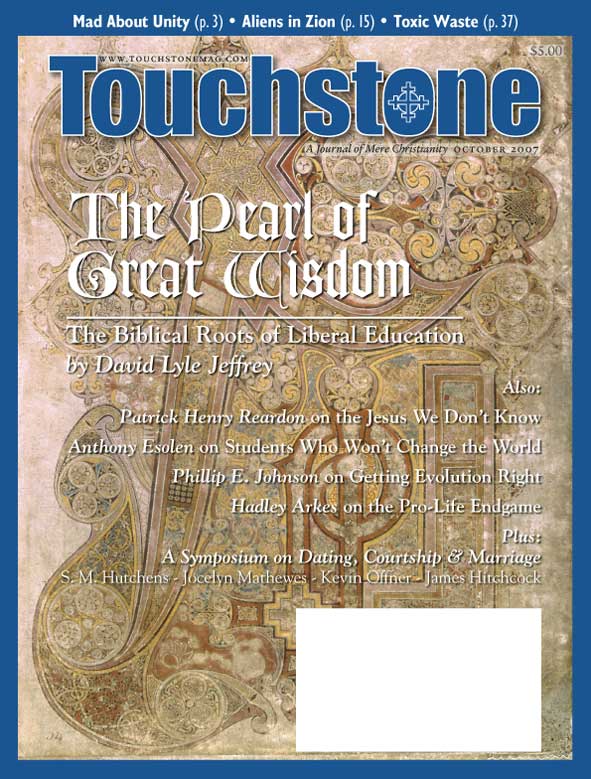Mad About Unity
The Unique Fellowship of the Clearly Divided
The main point of the Vatican’s “Responses to Some Questions Regarding Certain Aspects of the Doctrine of the Church”—written, apparently, against Catholics who continue despite frequent correction to distort the teaching of the Second Vatican Council for their own (liberal) ends—can be easily summarized as “The Catholic Church says that the Catholic Church teaches that the Catholic Church is the Catholic Church.” I would not have thought that this would be news to anyone, since the point was made in Lumen Gentium in 1964, restated in the Catechism of the Catholic Church in 1994, and amplified in Dominus Iesus in 2000, but it was.
Soldiering On
When the statement appeared in July, some mainline churchmen expressed their hurt and vowed bravely to soldier on in the ecumenical calling that Rome has now callously made so much harder.
A leader of the world’s Lutherans called the Vatican’s “exclusive claims” “troubling,” and said that “what may have been meant to clarify has caused pain.” An Episcopal leader insisted that “we are a ‘church’ in every sense of the word,” but added that “none of these disagreements, however, will lessen our commitment to remain in international and national ecumenical dialogue with the Roman Catholic Church.”
Others reacted more strongly. A leader of the world’s Reformed Christians declared that the teaching “goes against the spirit of our Christian calling towards oneness in Christ.” The statement, he protested to the Vatican, “makes us question whether we are indeed praying together for Christian unity.”
A leading Waldensian theologian in Italy said that the statement was “offensive for us as Protestants,” while an Italian church historian said it “fatally wounded” the Catholic Church’s ecumenical credibility. These reactions represent many others, and there were some more violent, like the American who declared that “someone needs to wake up the pope and remind him—and the rest of the guys hibernating inside the Vatican—that we are living in the year 2007,” pitying Catholic leaders for being “so blind to what God has been doing outside their isolated little world for so many years.”
For all the furrowed brows and teary eyes and puffed out chests, these responses were characterized by an implicit theological imperialism. These critics all appealed to some ideal of ecumenical understanding and a particular definition of the Church to condemn the Catholic Church’s restatement of her traditional doctrine. They said, in essence, that the Catholic Church was wrong to make the claims that she did, because (though as far as I know no one ever said this out loud) she is not who she says she is.
In other words, in the name of ecumenical understanding these critics insisted upon their own doctrine of the Church, with precisely the conviction but little of the honesty of the Vatican’s statement. A particular ecclesiology was hidden in moralistic assertions about ecumenical sensitivity.
Healthier and more helpful, certainly, was the kind of response exemplified in the Southern Baptist leader Albert Mohler, a friend of this magazine’s. He said in an article published by the Baptist Press that “Evangelicals should appreciate the candor reflected in this document. There is no effort here to confuse the issues. To the contrary, the document is an obvious attempt to set the record straight.”
He went on to say, with candor equal to the statement’s, that the nature of the Church
is an issue worthy of division. The Roman Catholic Church is willing to go so far as to assert that any church that denies the papacy is no true church. Evangelicals should be equally candid in asserting that any church defined by the claims of the papacy is no true church. This is not a theological game for children; it is the honest recognition of the importance of the question.
Having made the doctrinal disagreement clear (and I should note that not every Protestant defines the Church this way), he then said of Pope Benedict, generously and liberally:
I also appreciate the spiritual concern reflected in this document. The artificial and deadly dangerous game of ecumenical confusion has obscured issues of grave concern for our souls. I truly believe that Pope Benedict and the Congregation for the Doctrine of the Faith are concerned for our evangelical souls and our evangelical congregations.
The mainline leaders already quoted remind me of a dysfunctional family in group therapy all making “I” statements, in an attempt to dominate the others by proving themselves the greatest victim. I can imagine, were they living in another time, Dr. Mohler and Pope Benedict bowing to each other before drawing their swords, and the winner weeping over the body of the other. That kind of engagement is not only more romantic, it is more honorable and more useful.
Wrong But Not Wicked
Among the editors of this magazine, the statement raised not an eyebrow. This very diverse group includes several Catholics, the dean of the Southern Baptist seminary of which Dr. Mohler is president and other Protestants, and an Antiochian Orthodox archpriest and other Orthodox.
None of us is going to talk of feeling pained or complain that any ecclesial body states its teaching clearly. We would be disappointed if it didn’t.
Our first rule of operation, which has sustained a high degree of fellowship, even brotherhood, across traditionally sundering differences, is to assume that the other man may be very wrong, but he is not stupid nor wicked. As G. K. Chesterton said, the bigot is not the man who believes he is right. Every sane man believes that. The bigot is the man who cannot understand how the other fellow came to be wrong. We each can understand how the other came to be wrong.
We assume that the other man has plausible reasons for believing as he does, and that he is not consciously sinning against the light but pursuing it through the tradition of which he is a part and in the modes that tradition provides, even if we all think that the other traditions let in only part of the light. We assume he is pursuing a true Christian ideal, one we all share, even if we think his map is wrong or incomplete. We recognize his commitment to the shared Christian doctrinal and moral tradition.
We draw a firm line between us and the skeptics, modernists, liberals, relativists, and others whose adherence to their own traditions is partial or corrupt, and a thin and flexible line between us and those conservative believers who accept some apparently worldly ideology opposed to the shared Christian heritage, egalitarianism being the most obvious example. Hence our ability to draw together people who disagree about whether infants can be baptized but our mutual decision to leave outside the circle (if often just outside the circle) those who declare that women can be ordained.
One needs a certain generosity and liberality to do this, married (we hope) with a discernment of principle, but it seems to work. It allows us happily to do together what we can do together, which seems to us part of being a Christian.
Most of us find ourselves disappointing the stricter members of our communions, who think us liberals, while upsetting the looser members, who think us reactionaries. In my experience the intensity of the reaction is stronger from our left than from our right. The right tends to be quizzical, the left angry, and the center-left (those just outside the circle) the angriest of all.
The Way to Fellowship
But as I said, it seems to work. The way to whatever ecumenical understanding and fellowship we may achieve in this life, in which brother is divided from brother for what seems to each good reason, is not to deny the differences, especially when that denial is merely a way of asserting one’s doctrine.
The way to ecumenical understanding is to admit the differences, submit to one’s tradition, respect the integrity of the others, and join with them in facing the common challenges. This you can do with unfurrowed brow and clear eyes, the better to see your brothers for themselves.
— David Mills, for the editors
The Vatican’s “Responses” can be found at www.ewtn.com/library/CURIA/cdfrespchrch.HTM; Albert Mohler’s article at www.bpnews.net/BPnews.asp?ID=26073; and Chesterton’s remark in his Alarms and Discursions.
David Mills has been editor of Touchstone and executive editor of First Things.
subscription options
Order
Print/Online Subscription

Get six issues (one year) of Touchstone PLUS full online access including pdf downloads for only $39.95. That's only $3.34 per month!
Order
Online Only
Subscription

Get a one-year full-access subscription to the Touchstone online archives for only $19.95. That's only $1.66 per month!
bulk subscriptions
Order Touchstone subscriptions in bulk and save $10 per sub! Each subscription includes 6 issues of Touchstone plus full online access to touchstonemag.com—including archives, videos, and pdf downloads of recent issues for only $29.95 each! Great for churches or study groups.
Transactions will be processed on a secure server.
more from the online archives
calling all readers
Please Donate
"There are magazines worth reading but few worth saving . . . Touchstone is just such a magazine."
—Alice von Hildebrand
"Here we do not concede one square millimeter of territory to falsehood, folly, contemporary sentimentality, or fashion. We speak the truth, and let God be our judge. . . . Touchstone is the one committedly Christian conservative journal."
—Anthony Esolen, Touchstone senior editor









